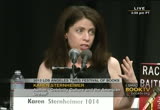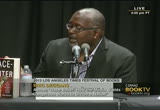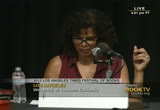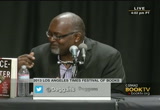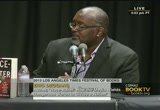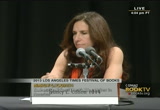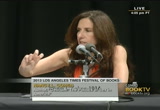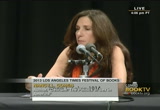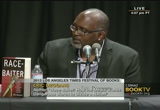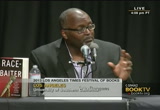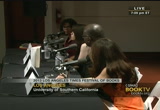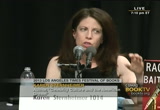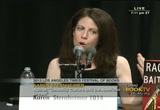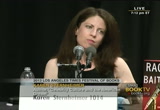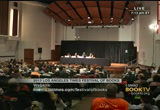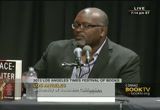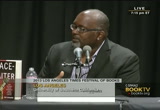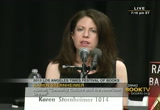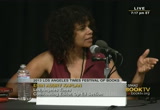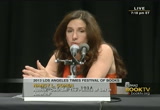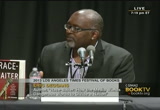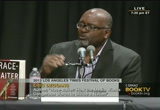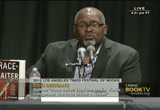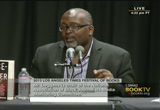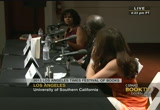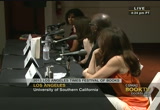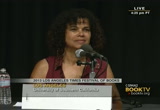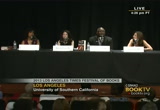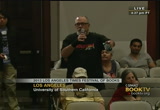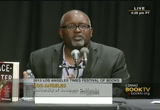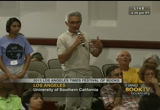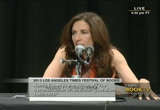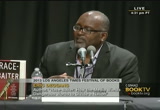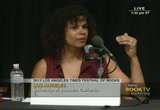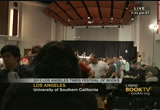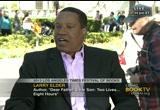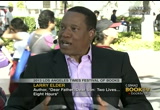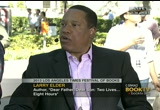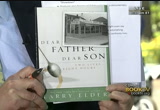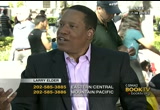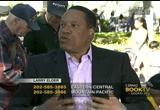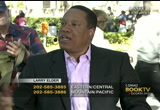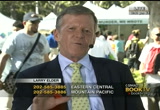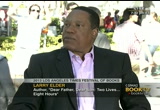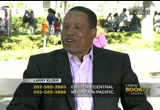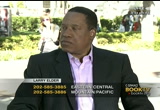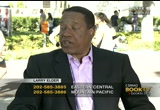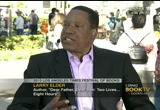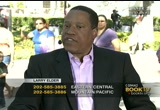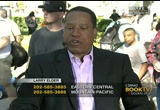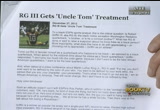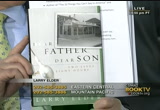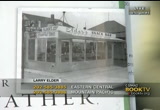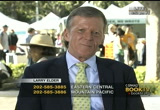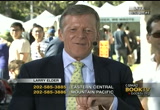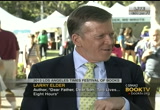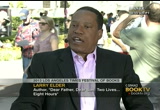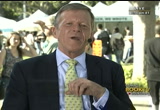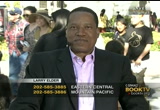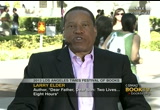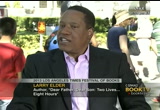tv Book TV CSPAN April 20, 2013 7:00pm-8:00pm EDT
7:00 pm
and prosperity after world war ii that we have a we think of as the quote traditional childhood and traditional family. in course people got left out of that tradition particularly african-americans and other people of color in the jim crow not just south of the north to map. >> in my book i talk about confronting and discussing with the president of "msnbc" in 2010 about pat buchanan and him being on that channel and saying you have a guy who is essentially friendly with white separatist, friendly with white supremacists. he has written a book that says america's diversity is its downfall. why is this guy in your channel? he said zero code you know he has a point of view that we should feature. ..
7:01 pm
[laughter] >> no thanks. you know, you bring up a good point. there's this fear about losing traditional america, well, they did lose it. thank god -- >> thank god. >> for some of us, right. you know, we don't have the jim crow signs, we don't have the lynching anymore. so we really did lose that traditional america that we never really had to begin, right? -- begin with, right? eric, i want to ask you, you know, race has -- you know, blackness has had a particular history with media where images were reality and, in fact, images and words supersealedded
7:02 pm
reality and in many ways still do. >> sure. well, the book in my chapter on network television, i talk about how the image of african-americans have evolved on television over time. and, you know, we started out with these really, with the sort of mamie characters, we had beulah on 1950s television, then we had amos and andy, and then we got to the supernegros which were diane carroll and julia and bill cosby on i spy. for black characters to exist side by side with white characters, they had to be perfect. they, you know, bill cosby was a rhodes scholar, he was a karate expert, he spoke seven languages on i spy, and the guy who was his partner was a tennis mom, you know? that's what he needed to be to be equal to the white guy. [laughter] so we've seen this sort of slow evolution, the ghetto coms in the '70s, good times, what's
7:03 pm
happening, things like that. then we got to the '90s where things were more expensive. and i talk about this ad that appeared, i think it was in essence, it might have been in ebony magazine where it showed a black kid who had a towel, safety pin to his back, and he was pretending to be a superhero, and he was looking in the mirror, and a white superhero was staring back at him. he had to imagine himself as a different race. and as a comic book geek from way back, that was the dynamic for a lot of us. so the reason that we're fighting so hard to improve the images of people in color in media so that we can dream bigger and better. and i think one of the best things about barack obama being elected president is that now you can turn to a black child and say you really can be president. >> but do you really want to? [laughter] no thanks, we don't want that
7:04 pm
job. >> one of the ways to oppress somebody is to get them to oppress themselves. >> right. >> so freeing these images in the media from stereotypes is about freeing people from the shackles on their own imagination. >> it's interesting how obama himself has become a one man cultural war just by being who he is. not just what he durksz who he is. as you mentioned, it seems like we have abortion rights, cob that sense -- contraception, and yet we have the pretty strong advance of marriage equality and gay rights. can you kind of speak to that? what's going on there? >> i think it would be the other way around. >> yes. >> really, really good question. and so as we know, hardly anyone believed in gay marriage ten years ago, and now there's significant majority support in pretty much every community accept among white evangelical
7:05 pm
conservative christians. and where we are with abortion rights is kind of comply -- complicated. on the one hand, we're about split between pro-life and pro-choice, but recent polling has shown close to half the people who define themselves as pro-life, support abortion. >> most americans support abortion rights, don't they? >> yes. >> and always have. >> so what we have is, i think where're going to wednesday up -- where we're going to end up with gay marriage, people are feeling way too overconfident right now, that there's this progress toward unanimity. and looking at the polls what the inexorable progress is toward the kind of 20% opposed in the same way that they're opposed to women's rights and abortion rights and sex education, um, and for some of them now birth control.
7:06 pm
and what, you know, kind of thinking about media and politics and the relationship between them, i think one of the reasons we have these strong right--wing outlets is because there's still an audience. and that audience is very politically savvy. so i think we're going to start seeing the same kinds of chipping away at gay rights that we have seen on abortion rights, and we're just in this moment, this kind of heady moment where people are celebrating what really is an important change. >> do you think there'll be a backlash setting in? >> i think it's going to be the same as the backlash is against abortion rights. i mean, this is where i think the media does exaggerate things, is we are not as divided as a country on this as the media presents us to be. there is a very committed, politically powerful minority that wants to take it back, and that is going to be the psalm group of people -- same group of
7:07 pm
people who will want to strip gays of whatever rights they are achieving thousand and going to achieve -- now and going to achieve in the next five or ten years. i don't really see fundamentalist christianity, fundamentalist mormonism, fundamentalist catholicism, fundamentalist judaism changing on this. >> i would say -- >> no, i don't either. >> i would say in the same way that i say media is motivated by profit, politicians are motivated by electoral results. and so the reason we've seen movement particularly from democrats on gay marriage is because they realize what a big piece of that played in the electoral fortunes that we saw in 2012. so the big question in 2014 is what kind of an electorate is going to show up. because what we've had in 2010 and in 2004 and these off-year elections, we've had a much older, a much more conservative electorate show up than showed up in 2008 and in 2012 courtesy
7:08 pm
of barack obama. so the question is, what kind of electorate will we see on 2014, and if the republicans take another hit where they lose seats in the house, then all of a sudden they realize that this strategy is going to lead them to ruin. and nothing motivates a politician like the threat they're going to lose their job. >> but i don't think they're going to lose their jobs in these gerrymandered, fundamentalist bible belt districts that are overrepresented in the senate and in the house. and so i think we're going to keep having this fight like we continue to have this fight on abortion rights. >> it'll be interesting. if we do see the same results that we saw this last time, there'll be enough of a chipping away that, you know, they'll have to, i think they'll have to recrr their position -- reconsider their position. >> okay. >> wow. um, karen, we're now talking about gun violence get again.
7:09 pm
in fact, because of the newtown shootings and, of course, obama's legislation went -- it actually passed, right? but it just was filibustered, wasn't -- did not come to the a vote. anyway, lost that. and he was visibly angry about that. but we keep returning to this argument that it's the media that's causing all this violence that's, you know, affecting people. so it takes us, you know, it moves away from public policy, and we just talk about what the media's doing. and in your book you actually say there's nothing to support that. but people, you know, are really -- want to believe it. and talk about that, you know, some. >> yeah. i think it's a very popular belief that, well, there's a lot of violence in video games and movies and television, and we see it, and we can easily be appalled by it. what we don't usually see are the actual studies that we hear about in the news that say, well, the latest study has shown that video games make people
7:10 pm
more violent. i recommend the next time you hear that on the news, you actually look up that study and see how they actually conducted the study. so that's what i do in my book, is i review these studies. now, some of the research that claims video games conclusively make young people violent, first of all, they're done on freshman psychology students in college. these are most dangerous young people that we should find out, you know, their propensity for violence? i hope not. >> i don't know. >> the other thing, too, if you look at some of the masses they use as proxy measures for violence, in one study it is playing a violent video game and then reading aggressive-sounding words on a screen, and if you read them quickly, that's having aggressive thought. so i always recommend look at what these studies are actually doing, don't look at the press releases. and sometimes the actual authors of these studies do not make the same claims that they get, as they sound when they're reported
7:11 pm
in sound bites. oftentimes social scientists are much more, i guess, cautious about stating their findings. but this is a really popular story, and what's interesting to me is how the news media >> and we often ignore everyday violence. the most likely causes of violence. first of all, young people are most likely to be the victims of violence at the hands of adults. not each other. we don't ask the media questions when it comes to adults.
7:12 pm
and i don't suggest that we do. so there's a lot of kinds of violence, urban violence. that goes on a lot. we don't create this national crisis over urban violation the way that -- violence the way that we do when there's a shooting, you know, a tragic shooting, but a shooting that involves young people. at least young people in a suburban, predominantly white neighborhood. and so these are the kinds of questions that i suggest we start asking when we're thinking about actual violence. it's very tempting to get caught up in the media violence question. one of the things i write about is media violence by its nature grabs our attention. that's why it's there, it's profitable. it sells well overseas. but in terms of understanding violence, social science isn't looking at for a long time. we ignore the more dull factors that don't make for good news report, substance abuse, family violence. one thing that i don't quite get is why some of the psychologists don't study mental health issues
7:13 pm
more. we have a mental health crisis in this country. we don't have mental health treatment for enough people, and that's the story. but it's more expensive to focus on that than it is, well, can't we do something once and for all about video games or movies? >> right. >> and, you know, can you really do something about video games and texting and, you know, the media keeps getting, you know, more and more sophisticated and more, you know, ubiquitous -- >> every so often congress will hold a hearing. this just happened, you know, over the last several decades, and maybe they'll call movie producers into a hear, and there'll be a nice dog and pony show, and they'll be berated in the front of cameras on c-span, and that's the end of it. maybe we'll have television ratings now, the video game industry will say, okay, we'll self-regulate, we'll have ratings. but the first amendment in the supreme court ruling in 2011 that, basically, decided this case about video games, the
7:14 pm
supreme court said this is protected by the first amendment. so it makes for politicians to seem like, hey, we're on your side, we're protecting your children. we're on your side of the culture wars. but in reality there's very little that can be done. and, frankly, i don't think we want to have a culture czar in this country telling us what is appropriate media content and what isn't. >> that sounds -- >> i would say on the media violence issue one of the things that people who work in media know, for example, is that the entire premise of a free broadcast tv system is that we show you images that make you want to buy a car or that make you want to eat a big mac or make you want to buy certain tennis shoes, and then you go out, and you do it. so the idea that we could show you constant images of, um, a police officer who is wronged and then goes out and shoots five people and makes it right over and over and over again,
7:15 pm
that that doesn't have some kind of effect. logically, it doesn't make sense to us. there has to be some impact from constantly showing you images that reinforce the idea that violence can accomplish something. the studies are inconclusive about it, but they don't necessarily say there's no impact. they just say that it's hard to figure that out, because some social scientists believe that people even in the, even in their unconscious mind can distinguish between an actual person and a fictional person. so you can, a healthy person can have a loot of fun play -- a lot of fun playing a video game, but when they're arguing with somebody, they don't automatically think that they're going to strike that person or commit violence against that person. and that's the one question that i think, frankly, we haven't studied enough to really understand. is there something about all of this -- because, you know, i love my violent -- [laughter] i love my violent media. i love sons of anarchy, i love
7:16 pm
the sopranos. [laughter] you know, i love silence of the lambs, you know? i'm a media critic who likes a lot of media that is violent. but i do also wonder about the impact of that. and i don't think we can totally shrug it off, but the solution to that, of course, is not necessarily handcuff the people who are making the media. i do think we have to have more discussion, more realistic discussion about these images and how to impact people and who should have access to them. and, you know, as a parent of an 8-year-old, you know, i'm trying to be careful about what she consumes. >> i would add to that, too, that there is -- we probably need more discussion about why we have so many images of violence. my concern is when the media seems like the only answer. and we stop looking at issues relating to poverty, to substance abuse, to, again, family violence, mental health. so i think there's nothing wrong with looking at what role these
7:17 pm
images might have. and also i always like to say parents have every right to decide they don't want violence, violent images in their household. but, unfortunately, instead of starting the conversation in the so-called culture wars, often this is the beginning, middle and end of the conversation about violence, unfortunately. >> you know, i've just been sitting here thinking, you said more than once that we kind of ignore, we keep ignoring the more complex reality. and this is a big political problem, but it relates to these culture wars. why do we, you know, what -- why, you know, 70% of the country, 80% support abortion rights or supports this or supports that, and yet the discussion of politics go the other way? is that, is that -- it seems to be that's a disturbing trend, to me. >> well, that's politics. >> yeah. >> and that's because this small minority has taken over the
7:18 pm
republican party. >> and then they've also taken over media. not taken over, but have a very sophisticated -- >> well, if we want to look on the background checks on guns, i think it's 98% of americans -- >> 98%. >> -- supported the background checks. and the people who blocked it were republican senators and a few democrats in red states who are terrified about being taken out by the right in their state. and the, you know, heavily funded nra lobby is, you know, in lockstep with the sexual fundamentalists. it's the same group of people who have pulled our actual politics so far to the right. so, you know, it gets back to eric's point about who votes. 40 million people who voted in 2008 did not vote in 2010. and that gave us the tea party. okay? so we have a midterm election coming up. i think people are demoralized because they're seeing, again,
7:19 pm
there's been no movement. we can't get anything done. so are people going to stay home because of that? and the only way, i mean, i agree these are very complex issues to discuss in the media. but if we want our politicians to act on public opinion, we all have to stay involved and push not just during an election, but in lobbying so that we can finally break the back of the extremists who are controlling our politics. >> right, right. >> exactly. and, you know, we've seen also that advocates on these issues have ways of presenting arguments that might have much merit. we saw death panels when there was an effort to deal with health care. in this latest we saw fears of a national gun registry where everyone who had a gun would be, you know, marked down somewhere. the thing i find so surprising about that is you don't think there's a database already somewhere that lists whether you have a gun?
7:20 pm
[laughter] i mean, we live in the modern age. everything about you is accessible on the internet in the some place, way, shape or form. and if the government wants that information, they will gather it whether or not you're aware of it. but all we're doing is permitting our law enforcement officers from having, you know, the tools to go after people who are getting guns illegally, buying them at gun shows and things like that. so one of the things we have to be careful about is that these inauthentic arguments sort of spread through the media, and they spread -- you know, one of the things i talk about in the book is that the fragmentation of media gives consumers more power than ever. you may not feel that way, but you have more power now than media consumers have ever had in history because you can choose where you're going to see something, when you're going to see something, and the technology exists to tabulate that. if you go to a web site, if you go to youtube, if you go to
7:21 pm
hulu, here or there, people will see that, and can they will know. ten years ago if you weren't in the nielsen family, nobody knew whether or not you were. watching television, and they didn't care. now there are a bunch of different ways for you to express your opinion about what's happening in media about where you put your attention, whether you buy it on itunes, whether you buy it on amazon.com, wherever you go, you're registering. but with great power comes great responsibility, right in so you have to find out about these issues. and you can't just go to the same three or four web sites that are going to tell you whatever makes you feel good. you have a responsibility to educate yourself a little bit more and make sure that your choices, make the sort of political impact that you want. however you want that to be heard. >> well, i have to say i don't spend a lot of time, you know, going to matt drudge and all that. i mean, i've seen it, but, you know, it's a big problem. i mean, that responsibility
7:22 pm
you're talking about, i don't think most people do that. they just stay with what reassures them, and that's what happens. and what nancy said is true, people are also demoralized. you say we have great power, most of you believe that. >> think about trayvon martin, right? trayvon martin is a 17-year-old african-american kid unarmed walking in a subdivision in florida. he gets shot and killed by a neighborhood watch volunteer. the police take the guy to the police station, they interview him, and then they decide we're probably not going to charge him. right? the family goes before the cameras and says we think he was racially profiled. the next thing you know change.org has a million signatures on a petition to say prosecute this guy. al sharpton holds this huge rally in sanford, florida, that draws thousands of people to say charge this guy. it becomes an international story. there are stories in papers in israel, in britain, in australia
7:23 pm
about all of this. and within a month george zimmerman is charged with murder. there you go. >> is that wrong? >> what i'm saying is people made their views known, and they got a result. >> uh-huh, oh, i see. >> the guy got charged with murder, and there's going to be a trial. i mean, before, you know, all of in this fragmentation of media, all these cable outlets, you know, the ability to get the petition out there and get the facts of the case, this all surfaced on social media first. if that hadn't happened, the police would have made their decision, and it would have been like, okay, you know? no charges. you know, and i kind of believe when somebody shoots and kills somebody, i want there kind of to be a trial to figure out what happened, you know if. [laughter] >> so the whole thing might have gone just under the radar had we not had -- >> it might have been just been a regional story, you know? this guy shot and killed somebody, the police won't charge him, they say there's not enough evidence, and then we go on to the next thing. but they weren't able to go on
7:24 pm
to the next thing because the world focused on that story because of social media and the fragmentation of media. and so many people were trying to get at that story, it became such a huge buzz that florida couldn't ignore it. now, there are some people who take his side who say that he was unfairly charged. >> well, there's always -- >> perhaps. but, you know, the world attention came on it. it forced florida authorities to look at the case, and now they have charged him, and we'll have a trial where we'll see this evidence, and a jury will decide whether or not he committed murder. >> so once in a while, karen, the high profile incident that's blown up by the media can do some good or can focus our attention in a good way. >> oh, absolutely. and i think that is the promise, too -- >> okay. >> so it's sort of like do we eat the convenience store, processed food that's really easy and we know how it tastes, or do we have the harder to come by but healthier, maybe for us as a society, story about, you know, an injustice that we
7:25 pm
actually can do something about or a case that affects the lives of real people in realtime. and so it's, i think it is a challenge to the, um, industry that produces news and news stories. it's a challenge for us too. but, you know, i think it's really important to know even though i say we can't blame the media for every social problem that exists, it does have power, and it is worthy of our examination. >> as eric said, we're all the media now, all of us, because we can get things out. every single one of us has that ability. i think on that note, we're going to open up to questions. if anyone has any questions, there's a mic somewhere. back there. yeah. >> two volunteers in the back who have mics, so just raise your hand, get their attention. >> yeah, there are two mics. >> hi.
7:26 pm
is it working? [laughter] can you hear me? >> yes, we can. >> okay. i was -- >> can you stand? if can you stand? >> oh, come on. [laughter] >> oh, no, sit down. sit down. >> yes. let me start by saying, and this'll be quick, but we have, look, let's face it, we have a revolting culture here. a culture that's actually fed by, nurtured by and calling for and rallying a very reactionary polarization. and i'm part of a movement for louis. as you can see, i'm kind of in paver of certain -- favor of certain kinds of revolution. i think it's extremely important that we start talking about things like that, because too much gets ruled out of order. >> okay. >> i've been to many panels this morning alone, and i never thought i would hear so many times the way people's questions are not even allowed to be framed is simply within a box of what exists now. the two parties, the electoral system.
7:27 pm
i think you're right about trayvon martin. and if it hadn't been for his parents standing up and saying to hell with this -- >> is there a question in. >> yes, i do. >> but i'm getting to it. [laughter] but the point is this: that we have to actually look at it. if you think about what, when this country had the greatest amount of change, it had the greatest amount of change when there was a movement for revolutioning and there was a very sharp and clearly well defined polarization here. a different kind of polarization. the 1960s, things changed. >> okay. all right, thank you. that's not a question. that's a statement. >> no, no, no. >> there are a number of people here -- >> let me get to the question, all right? >> okay. >> the point is, do you think that that kind of of polarization? >> he's asking a question now. >> he's asking. >> what the hell is going on here? >> with just, please, ask the question. >> do you think the kind of polarization we had then is necessary now? do you think it's needed? >> i think part of the problem
7:28 pm
that we have now is that the social issues that we're juggling are a bit more complex and less black and white than we were juggling in the '60s. in the '60s when you had segregation, when you had jim crow south, when you had blacks who couldn't live in the same neighborhoods as white people, when you had blacks who were barred from major universities, barred from major jobs, barred from voting, those kind of things are very basic and very easy to talk about. i think now we're at a situation where, um, you know, when you're talking about voter id laws, they've figured out a way to have that discussion in a way where the decisions aren't as stark. >> and it's not explicitly racial. >> and it's not explicitly racial. it's not explicitly racial. so the conversation has become more subtle. i think in the cases, a lot of the gender stuff that you're talking about, some people feel like, wow, didn't we decide this already? and people are just kind of
7:29 pm
shocked that it's even coming up again, because they thought the fight was over, and they don't realize that the fight has started again. so in some cases i thinkst that the -- i think it's that the issues we were talking about are more subtle and complex. in some cases i think the people who might be soldiers in this fight haven't realized that the fight has started. >> okay. okay, any -- yeah. >> thanks very much. i think it was an excellent panel. i would just like to suggest something and get your feedback on it or your comment on it. that perhaps a culture war isn't the best way to frame this. because that sort of suggests, to me, distinct cultural catches. who knows where they came from in their meeting on some battleground. whereas it seems what's going on is very familiar, and it's been going on a long time, and that's that we have a number of processes of modernization that have been going on for hundreds of years, and you've got elements of society resisting
7:30 pm
that. and it's conservativism, and especially republican conservativism resists modernity and modernization. you're practically saying that when you talk about reactionary politics. >> right. >> and, you know -- >> used the word modern once, i think that's a sort of missing. >> i think that's a very good point. i think a number of us who write about these issues, um, you know, fall into talking about it under the code word that it's talked about, culture wars. and i do agree with you that this is more about a reaction, what i call a counterrevolution in my book that is a small minority that is resisting modernization, progressivism, whatever. i do feel like we have a society that the mainstream doesn't want to fight these issues anymore. and i think that's part of the reason why people keep getting caught by surprise that we're still having these debates about race, about gender, about sexuality.
7:31 pm
and so i do think we need to think of this as not just a backlash, but kind of a deeper social reaction to what the world has become. and it's not going back to that traditional, so-called traditional way. >> right. and there are new issues. we didn't talk about the counterenvironmental revolution, the nonbelief in climate change and somethings like that, denying modernity. that's kind of a new thing, but it's part of the same dynamic. >> and i also think one of the things that we're missing is that we had a huge economic meltdown in 2008, 2009, 2010 -- >> still feeling the effects, by the way. >> of course we're still feeling the effects, but i think one of the reasons why we saw the return of this kind of politics is pause life had had -- is because life had had become so uncertain for a great many people, and i think social conservatives saw an opening to say, okay, here's how we get back on track. >> that doesn't work. >> to go back to this
7:32 pm
traditional american values and this will put us back on the right track, and then we had an election which which gave us a verdict on that strategy which was, no, thank you very much. we're not buying it. so part of it, i mean, i think people who wanted mitt romney to win that election spent a good year fostering that idea, that idea that our economic instability, that our problems in getting on track in terms of our economy were the result of these permissive attitudes embodies -- embodied in this democratic president. and now the question is will, will we move on to a different conversation. >> or to a different reality. because, you know, i've heard that, you know, the republicans are pushing the conservative thing. the democrats are more or less going along with it, afraid of alienating people over these traditional issues. it makes you think that there has to be another party or another reality altogether that,
7:33 pm
you know, needs to happen. there's hands -- oh, oh. sorry. do we have time for one more question? no, we do not, i'm so sorry. but we can continue the conversation in the book signing which is area one outside. thank you very much. nancy cohen, karen stein heymer -- sternheimer, sorry. thank you all for coming. [applause] [inaudible conversations] >> and you're watching booktv on c-span2's live coverage of the los angeles times fest festival of books held on the campus of the university of southern california. we've got one more segment coming up today and then, of course, full coverage again tomorrow. you can find the full schedule
7:34 pm
at booktv.org. well, now joining us on our booktv set is radio talk show host, columnist and lawyer larry elder. his most recent book, "dear father, dear son: two lives, eight hours." mr. elder, who is randolph elder? >> guest: randolph elder was my father. you heard the term tiger mom? my dad was a junk yard dog dad. he was one of the first black marines, and i knew that my dad was a marine, and because of his gruff exterior i sort of thought that marines were just sort of mean, brutal people. my brothers and i could not stand my father. i mean, we couldn't stand the s.o.b.. we thought of him as cold, as uncare, as unloving, unlovable, and whenever he came into the house, it always changed the atmosphere in the home. when i was 15 years old, my father and i had a furious
7:35 pm
fight. we didn't speak to each other for ten years. so the book is all about the conversation my dad had when i was 25 years old a conversation that i thought was going to last ten minutes, it ended up lasting eight hours. and he morphed into this kind, caring, sensitive man that i completely misunderstood my whole life. so the book really is a 247-page apology to the man. >> host: in here you write that your dad felt during that conversation that he hadn't done anything wrong in your childhood. >> guest: he hadn't. what i planned on doing when i was flying into l.a. to meet with him was to be very calm and talk about all the things that he'd ever done to me and my brothers that i thought were abusive, mean-spirited, what i thought were bad things for a parent. and so i promised myself i was going to be calm, i sat down, and i unloaded on his put for 20 minutes. and this and this very angry. my father sat there, and he said very quietly, i was afraid of my daddy too.
7:36 pm
my father never mentioned his father. there was kind of a no-fly zone over talking about my dad's life. and in this conversation i found out that my father did not know the name of his biological father, he never met his biological father. i didn't know that until this conversation. it turns out my father had an abusive relationship with his mother. his mother and he quarreled. my dad came home from school one day 13 years old, had a fight with the mother's then-boyfriend, another man, not elder. the mother sided with the boyfriend, throws my father out of the house. athens, georgia, just a few years before the beginning of the great depression, 13 years old, and he never returned home. and the on the front porch of the home his real mother yelled at him and said you'll be home, either that or you'll be in the penitentiary, or you'll be in prison, in the cemetery or in prison, is what she told him. and my father went next door and then to another door to another house to get a job.
7:37 pm
and so my father literally went door to door to find some sort of job. he ended up becoming a pullman porter for the trains, and my father visited california at the time. and he thought kind of he'd make a mental note of it, maybe he'd come back to california. so he comes out of the service, he goes to chattanooga, tennessee, he walks to an unemployment office. the woman tells him he has to go back out and go through the colored only door. he says, this is bs, they don't have colored doors in california, i'm going to get a job as a cook. he goes restaurant to restaurant, and they say, i'm sorry, sir, you have no references which is their way of saying in california, we don't hire black people. when he was in chattanooga, they told him we flat out don't hire n-words. he walks through a door, asks for a job, he says what time do you close? 8:30, 5, my dad sat there the
7:38 pm
next day 59 8:30 til 5. lady calls him up and says, sir, i've got a job. my dad says what is it? she says it's a job cleaning toilets. my dad worked at that job for ten years, took a second job for ten years also as a janitor, cooked for a family on the weekend, went tonight school to get his ged that he never got. i never saw a human being work that hard. so you add his work ethic, how much time he spent working, how little sleep he had, plus he comes home and is greeted by three rambunctious boys, okay, he wasn't ward cleaver, i give him a mulligan. my dad hit me with a belt. when i was having a book tour with somebody, i mentioned it, and the interviewer says, he didn't hit you with the telephone cord? and that was in the next chapter. this is how people disciplined people in those days, especially if you were from the south, especially if you came from a background where you had a
7:39 pm
mean-spirited dad, quote, in your own life. the man that my dad is named after, elder, was abusive, he was an alcoholic who physically beat him and his mother. again, all of this my dad spills out in this eight hour conversation. and i realize that my daddied the best he could by his definition. his way of punishing me was kinder, gentler and more sensitive than the way he was punished. my dad felt i put a roof over your held, clothing on your back, what's the problem? he never had that. i wanted ward cleaver. my dad was not ward cleaver. i give him a mulligan. >> host: your dad also said to you that he was of there for you. >> guest: and that's the other -- >> host: he stay with the his mother. >> and that's the other point. here i am thinking that my daddied not love me. he got up every day, he came home, he wasn't abusive, he and my mom resolved things in an intelligent way. why i thought he didn't love me is beyond me, and one of the reasons i wrote the book is to
7:40 pm
tell people, many of whom who have had bad experiences with their own dads, often there's no manual. these people is have no better experience, they did the best they could. they did their job, they were the role model. and as long as the old man is above the ground, you can still reach out and perhaps repair the relationship, which is what i did. there's one other wrinkle in the book. i was living in cleveland, i met my uncle. my uncle happened to be a man who lived with my dad before my dad met my mother, none of which i knew. so imagine growing up with a man who had no friends. it was never for my dad, it was always for my mom, and fast forward to meeting a man who knew my dad before he met my mother? he said, i lived with him, i know him better than you do. either he's changed, which i doubt, or you've misjudged him. so that is what gave me the incentive to sit down with him. i can't say i had this epiphany
7:41 pm
and i figured there was going to be a wonderful rapprochement with my dad, but i figured i'd tell him off, and at least we would understand respective positions. but it was luck. so i want people to know don't rely on some chance end counter. if he's still around, maybe just you completely misread the old man? and until you resolve your relationship with your father, there's going to be something that will be missing. i felt kinder, happier, lighter when i reconciled with my father. it made everything better x there's always going to be an itch that needs to be scratched if you don't resolve that. >> host: our guest, larry elder. radio talk show host, columnist. the firms are up on the -- the numbers are up on the screen. we're talking about his most recent book which is a memoir. mr. elder writes a lot about politics as people who follow him know. if you'd like to dial in and talk about that as well,
7:42 pm
202-585-3885 in the east and central time zones, 585-3886 if you're in the mountain or pacific time zone where we are right now on the campus of usc. mr. elder, chapter two, if "norl was hate." my hatred for my father was not the kind where you get a spanking, seethe for a bit and things go pack to number -- go back the number because you realize he punishes you because he loves you. norm was intimidation. normal was tense. normal was wondering if you would say something that could set him off. normal was hate. >> yeah. when people look at me and i'm smiling, they often wonder why is it that i'm so sort of nonchalant about it. i'm writing that from the perspective of a child, andering seems romantic, everything seems awful, everything seems brutal. the fact of the matter is once you have perspective and realize
7:43 pm
that my dad was doing the best that he could, i thought his punishments were excessive, and i think another parenting model would have been more appropriate for me, but within the bounds of acceptability, it certainly was. my father, as i said before, was ill-tempered in part because he was so tired all the time. imagine averaging four and a half to five hours a sleep a day for probably two or three decades. that's what the guy was like. and then you walk into the house and have three rambunctious kids. my brothers and i would have our toys on the carpet when our dad would walk in in the middle of the floor. he would kick them so hard, the toys would often break. i thought that was insanity. and one time when i got older, i mentioned this to my mother. i said, why didn't you say something about that? she said, he didn't kick my stuff. and it turns out my mother had a pair of shoes before we came along, my brothers and i came along, and my dad came home and kicked her shoes so hard they flew and kicked the wall.
7:44 pm
she said, you do that again, i'm gone. and he never did it again to her, but he would kick our stuff. >> your dad was a republican. >> guest: he was a republican. my father always felt that the democratic party offered you something for nothing. my mother was a democrat. and so at the table the two of them would have these battle, and i would go back and forth. and i sided with my mom when i was younger, but when i got older and older, i thought my dad made more sense. he had a few simple rules. hard work wins, you get out of life what you put into it, and no matter how hard you work, bad things are going to happen, and how you respond will tell us whether we raised a man. i would always say, not too much pressure, dad. >> host: larry erld, you recently wrote a column about african-americans and fatherhood saying that patrick moynihan back in the '60s said there was a national tragedy because 25% of african-american children were born in unwed households. >> guest: right. >> host: today that number is 75%. >> guest: yeah. i was a freshman in college in
7:45 pm
1970, and daniel patrick moynihan called the negro family: a case for national action. and at the time, 25% of kids were born outside of wedlock. and moynihan said this was horrific, this is a neutron bomb dropped on the community, and if something isn't done, this could be horrific. it could lead to greater dependency on welfare, crime. over 70% of black kids are born outside of wedlock, so more white kids are born outside of wedlock than the number that triggered this alarming book. i believe that the direct link between not having a father in the house and all sorts of social problems up to and including murder. i was on the pearce be morgan show a little while ago, and i told him the face of gun violence in america as horrific as sandy hook was is not some suburban kid, it's a brown or black kid in the ghetto. if you look at chicago, chicago's on track for two sandy
7:46 pm
hooks per month. usually against another black person. yet chicago is about a third, a third and a third black, white and hispanic. why would so many murders come from the black community? the answer is so many kids come from parents without fathers. you look at violation, we're talking about gang-related kids, usually young kids. there was a documentary that my dad and i discussed in the book called resurrection, and it was about truth pack shakur. tupac shakur. and he said white people may like hearing me say this, but i know for a fact if i'd had a father in my life, i would have had discipline and confidence. and he went on to talk about the fact that he joined a gang because he didn't have a father, he wanted structure, he wanted protection. and he went on to say in a way maybe a conservative right-winger might say that it is important for a boy to have a father in his life. a boy needs a father. tupac shakur said this. there's also a pole that the l.a. times took in the mid '80s where they asked poor
7:47 pm
people and non-poor people the following question: do you believe young, poor women often have children to gain additional welfare benefits? most nonpoor people said no. but when poor people were asked the same question, 64% of poor people said, yes. so what i'm saying is we are financially incentivizing women into engaging in behavior that's counterproductive, and we're allowing the man to abandon his financial and moral responsibility by allowing the woman to marry the government. these are policies that we have done, both parties, with the best of intentionses. and i think they are a net negative on our society. and so we're blaming high capacity magazines, we're blaming racism, all sorts of things when, in fact, we need to look in the mirror and recognize we have advocated policies that have been antithetical to the formation of a nuclear-intact family. >> host: larry elder, where can people hear your show? >> guest: i can be heard on kabc
7:48 pm
here in l.a. my twitter handle is @larryelder. i'm on facebook. >> host: do people go online to listen to you in. >> guest: yes. >> host: you had a national show. >> guest: you can hear my show in bangladesh. i get phone calls sometimes from abbottabad -- not really. [laughter] you can hear my show anywhere. >> host: one of your previous books, "what's race got to do with it," we talked earlier in this program with eric deggans whose newest book is called "race baiter." he got that name because bill o'reilly called him a race baiter saying he wrote about race. there's a victim of -- a culture of victimology among some african-americans. what are your thoughts? >> guest: i have a word i coined, and it means somebody who blames others for his or her flight. i don't believe rh is -- racism is a major problem in america
7:49 pm
anymore. i subscribe to what i call the elvis factor. 10 percent of the american people believe elvis is still alive. so you start with 10%. 10 president of the american people have to be written off. is there racism? of course, but is there the kind that can stop any person who has gotten an education and has some dedication and is willing to work hard and has a little bit of luck in no. america is the greatest country in all of human history. that's why most of the world's seven billion people want to come here. >> host: recent column, then we're going to go to calls, rgiii gets uncle tom treatment. what is this column about? >> guest: it's about a sports caster on espn who criticized rg iii who talked about the fact that the criticism was that rg iii may be a cornball brother. and the reason he is as far as this guy's concerned is because he might be a republican. so becoming republican is a four-letter word for a lot of
7:50 pm
people. rg iii came from a nuclear-intact family. he doesn't think of himself as a victim. he doesn't think of himself as a trailblazer as far as his race is concerned. he's trying to be the best rg iii he could possibly be, and for a lot of people that means he's a sellout and an uncle tom. it's outrageous. he's a starts guy, for -- sports guy, for crying out loud. wins and losses ought to be the way we evaluate rg iii. >> host: was your book tough to write? >> guest: people have asked me that, and i suppose it might have been, but that was -- i was 25 years old when we reconciled, and i wrote the book a couple years ago. so i've had plenty of time, my dad and i have had 35 years to work op our relationship, and arguably we were closer than my mother and i are. my mother and i are very close. so it wasn't difficult at all. it was, again, a 247-page apology to the man. i was anxious to get it out before he died, and i was able
7:51 pm
to do so. >> host: how far was your boyhood home? >> guest: i was born in south central, picot union which is a pretty heavily hispanic area. and then my dad moved up to south central. we were the second black family on the block, and within five years the whole block was all black. >> host: larry elder, there's a picture on the front of your book, very quickly. and i promise then we'll go to calls. what is this a picture of? >> guest: that's a picture of my dad's restaurant. and if you can look very closely in there, you can see my dad leaning over there. it's one of the rare only photos we have of my dad's café. that's where i was born, in that little house right there. my dad tore it down after the place was zoned for light industrial and built the restaurant there. lousy location. you can't see it, but the food was so good, people found their way. >> host: and you hated working there. >> >> guest: i wouldn't stand working for you. he cursed at me. he would get volatile and start
7:52 pm
yelling and screaming. you can see how small it was, it was embarrassing. and i told myself the next time he cursed at me i'm going to walk up to him and say, now see here, buddy. i didn't have enough guts to confront him, but we did have the conversation that lasted a few minutes, and then we didn't talk for ten years. >> host: i'm done talking, it's your turn. larry elder's our guest. henry in bay shore, new york, you're the first caller. >> guest: i can't hear. >> host: hi, henry. last chance. we're going to move on to ohio, there'd doe, ohio. anthony? anthony, you're on booktv on c-span2 with larry elder. hi, anthony. >> caller: hi, how are you? >> host: please go ahead, sir. >> caller: yes. i was wanting to ask mr. elder, is he having any plans on having another talk show again? [laughter] >> guest: well, anthony, thank
7:53 pm
you for the question. from your lips to god's microphone. i'd love to have another talk show, i'd love to have a show along the lines of a hannity or reilly, political show where you call in and give your opinions, and i'm looking around to try and find that. hopefully, that can happen. >> host: is radio the only thing you're doing right now? >> guest: well, i'm writing a play. i've had a meeting with sony pictures, and they've begin me some optimism maybe this project could be a movie someday. and i want to make it a play first along the lines of what tyler perry did. and then take it to a production house and maybe get it made. >> host: would you star in it like tyler perry does? >> guest: no, i'm not an actor. [laughter] >> host: are you still a lawyer? practicing lawyer? >> guest: i am. i'm not practicing, but i'm still a lawyer. i haven't been disbarred. >> host: john's in west lake village, and i have no idea what your state is, because it's all run off the screen. tell us your state and go ahead with your question or comment. >> caller: california.
7:54 pm
>> host: thank you, sir. >> caller: i guess i have three questions. number one, do you have any children? number two, do you treat your children or would you advise treating your children the way your father treated you? and, number three, does the, does the way your father treated you affect your relationship with people and the way that you approach political discussion? in other words, do you consider yourself -- [inaudible] of the people when they disagree with you? >> guest: well, thank you for that. um, i think the first question was how do i feel -- >> host: do you have children? >> guest: do i have children, thank you. no, i don't. and people have asked me whether or not my not having children had to do with way my father and my mother raised me, and i think probably so. i remember watching them when i was a kid in the kitchen
7:55 pm
watching them discuss something financial, and i remember saying to myself, this doesn't seem like a whole lot of fun. and i really thought that fathers were mean task masters, and i never wanted anybody to feel towards me the way i felt towards my father. when i got into college and i had classmates and was invited to their homes, i saw their homes were very different from my home, and they felt very differently towards their father. so i realized it was not necessarily the way it had to be. but the i do think it probably made me feel, maybe understand how hard it is raising children, what hard work it is and how labor intensive it is. and what i wanted to do was to be a writer and do a lot of traveling. i think i felt probably that i didn't want to make those kinds of sacrifices. i have an enormous appreciation for what my mother and father went through and all of the sacrifices that they did financial and otherwise. when people decide to raise children, i think it is the most important decision you can possibly make maybe short of going into combat. my goodness, you can't send them back? they often don't turn out the
7:56 pm
way you want them to turn out. they often get angry when you're trying to do the best for them. it's a thankless task. but i think the rewards are there, and now that my friends are having kids that are my age, i see why they put in the work. if i had to do it all over again, i probably would have kids. >> host: has it affected your relationship with people, as that caller asked? >> guest: um, i think probably so. i think when you don't feel loved by your father, it makes you a little less warm and a little less loose. and as i said, when my dad and i reconciled, my friends noticed a difference in my personality. they thought i was funnier, happier, more accepting of other people. so i think early on some of this imprinting might have made me have decisions about family and that sort of thing. >> host: patrick, peter borrow, new hampshire. >> guest: thank you for remembering the questions, peter. [laughter] >> host: please go ahead. >> caller: thank you very much. i would like to ask mr. elder -- well, first, i would like to say i really admire your, and am
7:57 pm
impressed with your courage you had to confront your father and go through the working things out with him. i couldn't think of a word the use. >> guest: that's right. >> caller: and i grew up with a very loving father. however, my mother was an alcoholic, so they had all of these fights when i was really young. and i was never aware of what was going on. and so, um, i never, you know, i always want withed my father -- wanted my father to tell me why he was so angry and stuff. and, of course, later on i figured it out. but my question is, um, how open do you think, you know, from your experience, how open dune
7:58 pm
dune -- do you think a father should be with their children or child as to how, what his feelings really are and, you know, how -- you know, his most intimate feelings as far as things he might be dealing with within himself, his own issuesesome. >> guest: right. >> host: all right, patrick, i think we got the point, thank you. larry elder? >> guest: well, i think it's the $64,000, and what you're really asking is to what extent should your father be a friend as opposed to being a parent, and the answer is real simple, he should be a parent. whatever stories the parent has that could perhaps give a lesson, a life lesson to the child, the father should use. but, again, as i said before there's no handbook here. and my book is written from the perspective of my dad. we often talk about how we are raised from the perspective of a child, but we don't think about how our fathers feel about disciplining us. my father told me he didn't like
7:59 pm
doing it, but he wanted us to turn out okay, and he was willing to go through the necessary years, in my case, of being the bad guy in order to achieve the objective which was to have three well-grounded boys. >> host: who are kirk and dennis? >> guest: they are my two brothers, i'm in the middle. dennis was wayward and kirk was much more solid. both of them are vietnam-era vets, dennis in the army, my brother in the navy. dennis, he and i could not stand each other. we fought night and day, day and night, 24/7 the way a lot of boys do. and my little brother, i think, had a problem with me because i was such a good student, and in those days teachers were so insensitive, they would often say to my little brother, how come you're not like larry? so dennis, i think, early on decided to be the anti-larry. i think now a school psychologist would intervene, and we probably would deal with him a little better, but kids often compared him to me, and i
8:00 pm
think my little brother wanted to be the anti-larry, as i explain in my book. >> host: where are they today? >> guest: dennis died about 15 years ago. my older brother is still around, he is a foreman with a major oil company, happily married, has three children -- by the way, both of my brothers married women who had children and went on to have very long marriages. >> host: talk about your brother's funeral and your mother's view and your view and what actually happened. >> guest: you're talking about dennis' funeral. and, again, this is the brother that i didn't get along with. and my brother dropped out of high school. he did a lot of drugs. the military straightened him out. but he got out. he was still fairly wayward. and when he died, i said to my mother, we'll just have a very small service because dennis, dennis' friends are scattered here and yon, and they're not the kind of people that you can reach on a phone and will show up. and she says, you don't know him. we need to have a big
100 Views
IN COLLECTIONS
CSPAN2 Television Archive
Television Archive  Television Archive News Search Service
Television Archive News Search Service 
Uploaded by TV Archive on

 Live Music Archive
Live Music Archive Librivox Free Audio
Librivox Free Audio Metropolitan Museum
Metropolitan Museum Cleveland Museum of Art
Cleveland Museum of Art Internet Arcade
Internet Arcade Console Living Room
Console Living Room Books to Borrow
Books to Borrow Open Library
Open Library TV News
TV News Understanding 9/11
Understanding 9/11